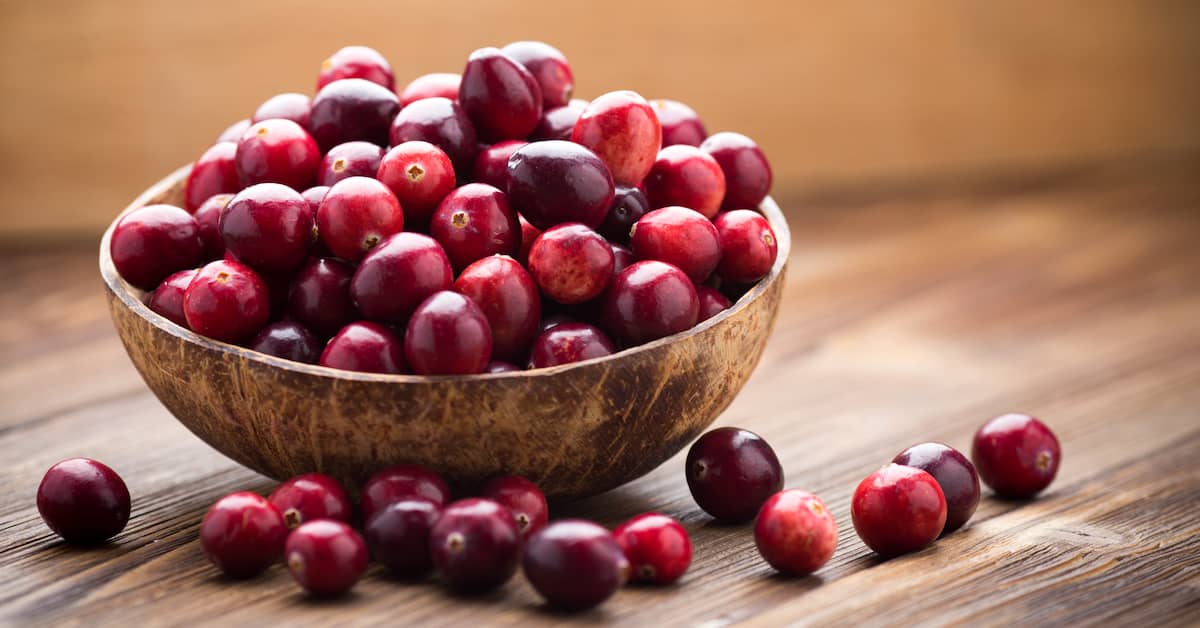
Cranberry Logic
The cranberry is indigenous to North America and was a key ingredient in the original energy bar 400 years before anyone knew what a superfood was.2 According to the American Indian Health and Diet Project, Native Americans dried the fruit and combined it with ground, dried deer meat and fat, creating what is called pemmican. They say everything old is new again, so it’s no surprise that modern researchers chose to put cranberries to the test. “Past studies have shown that higher dietary flavonoid intake is associated with slower rates of cognitive decline and dementia,” Dr. Vauzour notes. “And foods rich in anthocyanins and proanthocyanidins, which give berries their red, blue, or purple color, have been found to improve cognition.”3 He explains that cranberries are rich in these micronutrients and have been recognized for their antioxidant and anti-inflammatory properties. “We wanted to find out more about how cranberries could help reduce age-related neurodegeneration,” he adds.A Little Goes a Long Way
To test their hypothesis, researchers followed the progress of 60 cognitively healthy adults aged between 50 to 80 years for 12 weeks while they consumed either freeze-dried cranberry powder or a placebo daily. Before and after the study, researchers assessed the subjects’ cognitive function and collected blood samples to measure their memory skills and cholesterol. What did scientists discover? Participants consuming the cranberry powder, equivalent to just one cup of fresh cranberries, exhibited significant health results. It turns out that cranberry consumption significantly improved the participants’ memory of everyday events, neural functioning, and delivery of blood to the brain. “We found that the participants who consumed the cranberry powder showed significantly improved episodic memory performance in combination with improved circulation of essential nutrients such as oxygen and glucose to important parts of the brain that support cognition -- specifically memory consolidation and retrieval,” Dr. Vauzour states. But that’s not the only health benefit…Heart Health Helper
The cranberry group also exhibited a significant decrease in LDL cholesterol levels, known to contribute to plaque build-up in the arteries or atherosclerosis. This finding supports the notion that cranberries also aid heart health by dilating blood vessels, which optimizes the delivery of blood to the brain, positively impacting cognitive function. "The findings of this study are very encouraging, especially considering that a relatively short 12-week cranberry intervention was able to produce significant improvements in memory and neural function," Dr. Vauzour adds.My Takeaway
While I’m a fan of cranberries and their health benefits, there are a couple of drawbacks to this study. First, it’s a small sampling, and second, it’s funded by the Cranberry Institute, which probably has a vested interest in the findings. In fact, the cranberry industry took some heat a while back when juice company Ocean Spray spent $10 million to fund research on the mighty cranberrry’s urinary tract benefits. (That being said, the urinary tract benefits of cranberry are substantial and very real.) In response, the not-for-profit Cranberry Institute now plays a more significant role by funding scientific research. This particular study appears legitimate, and I’m not worried that eating cranberries can adversely affect your health. In fact, I’m pleased that scientists continue to study the impact of polyphenols like those found in cranberries. They have been proven to have powerful health-promoting antioxidant and anti-inflammatory properties to help people fight a number of illnesses associated with aging like dementia and cancer.4 However, cranberries don’t have the market cornered when it comes to these natural superheroes. These polyphenol compounds are also found in other berries, as well as cherries, apples, and plums. There are also hefty doses of polyphenols in beans, nuts, cocoa, and green tea. With that said, it’s not a bad idea to sprinkle some dried cranberries into your yogurt or salad. (I might skip the pemmican, though!)- https://www.frontiersin.org/articles/10.3389/fnut.2022.849902/full
- https://www.nationalgeographic.com/science/article/131127-cranberries-thanksgiving- native-americans-indians-food-history
- https://www.uea.ac.uk/news/-/article/how-cranberries-could-improve-memory-and-ward-off-dementia
- https://www.ncbi.nlm.nih.gov/pmc/articles/PMC4060835/
